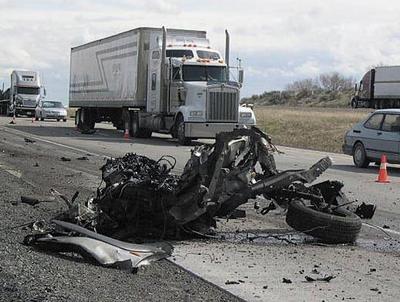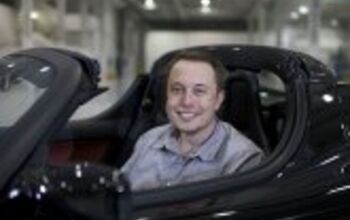Death
A friend was riding in the passenger seat of a new Buick Lucerne last month. The driver turned left across an intersection—and was met head-on by a pick-up trying to beat the light. All the big Buick’s safety features worked like a charm. No one in the car was seriously injured. In an initial effort to minimize the accident’s significance, the driver bragged that he’d been through much worse. Personally, I don’t think that’s anything to be proud of. Grateful might be a better reaction.
Whether we personally witness– or experience– the savagery of automobile accidents, we all know it’s a meat grinder out there. Yet we continue to drive, purposefully blind to the possibility that our life could be cut short at any moment. It’s easy to ignore the less immediately apparent ways the automobile might be eroding our life span: pollution, obesity or the aesthetic assault on our landscape. But how can it be so easy to disregard the quick and brutal way in which a pleasant afternoon drive can become a violent death? And why would anyone decide that their cell phone, make-up, or Big Mac is more important than their safe return home?
I suppose it’s human nature. Our talent for distancing ourselves from catastrophe, both mentally and emotionally, allows us to get on with life. Under the bright light of rationality, we understand that death is a certainty. But not now, we tell ourselves. Not here, not yet. We banish any thoughts of potential disaster and get on with the task at hand. And why not? Today’s safety-glassed, plasticized, brake-assisted, stability controlled, belted, bagged and crumple-zoned cars are safer than Ralph Nader could ever have dreamed. We can avoid or survive accidents that would have killed us a decade ago. We’re safer, and we feel it. And yet…
There may be a few degrees of separation between us and a road-related fatality, but there’s no separation between us and other accidents. We’ve all survived fender benders; many of us have walked away from serious shunts. Unfortunately, the experience leaves us shaken, but not stirred. Maybe we feel differently about people who die in auto accidents than we do about those who fall victim to crime because drivers make a free will decision to get behind the wheel. But none of us really expect to pay the ultimate price, do we? Like juvenile delinquents, we presume the other guy will foot the bill. And so they do– until they don’t.
I realize that humanity is one big social marketplace. If the automobile exacted a socially unacceptable human toll, we’d all stop driving. Instead, each of us calculates the odds against our own death, determines them to be acceptable, and ventures out onto the streets. There is no choice. Our society is built upon the car; we’re completely dependent on it. But that fact offers no absolution. We must face the reality that death stalks our highways, and take the appropriate preventative measures.
So, does this add up to just another trite and trifling reminder to ‘drive safely’? Maybe it does. But each driver needs to realize that we are playing God with the lives our passengers, our fellow drivers and ourselves each time we head out of the garage. Around 42k people are going to die on the roadways of the US this year. Maybe that’s an acceptable price for our society to pay in exchange for the personal mobility and clear economic advantages of automotive travel. But maybe the cost doesn’t have to be that high. We drivers treat the issue of fuel expense with deadly seriousness. It’s time to treat the expense in human life just as seriously.
Driver’s Ed instructors used to show aspiring motorists grisly images of horrific car wrecks, to make them appreciate the stakes involved. I’m not sure when the scare tactics stopped. I took drivers’ training in 1989. By then the practice was over. It was probably deemed ineffective or politically incorrect. Regardless, we weren’t forced to view the carnage. Of course, what you don’t see can hurt you. Shortly after I graduated from high school, a classmate was killed in an accident not far from my house. That afternoon changed my outlook on life — for a while. Like millions of other motorists, I eventually got over it. After all, it didn’t happen to me.
What would it really take to get drivers to change their potentially lethal habits? If teenagers can laugh off graphic films of accidental decapitations, if commuters can speed by roadside flowers without a second glance, how can we communicate the need to drive with vigilance, caution and respect? It seems that no matter what we do, Darwin and the Grim Reaper stay focused on their ghastly assignment.
More by Bryan Myrkle
Latest Car Reviews
Read moreLatest Product Reviews
Read moreRecent Comments
- Justin You guys still looking for that sportbak? I just saw one on the Facebook marketplace in Arizona
- 28-Cars-Later I cannot remember what happens now, but there are whiteblocks in this period which develop a "tick" like sound which indicates they are toast (maybe head gasket?). Ten or so years ago I looked at an '03 or '04 S60 (I forget why) and I brought my Volvo indy along to tell me if it was worth my time - it ticked and that's when I learned this. This XC90 is probably worth about $300 as it sits, not kidding, and it will cost you conservatively $2500 for an engine swap (all the ones I see on car-part.com have north of 130K miles starting at $1,100 and that's not including freight to a shop, shop labor, other internals to do such as timing belt while engine out etc).
- AZFelix Let's forego all of this dilly-dallying with autonomous cars and cut right to the chase and the only real solution.
- Zelgadis Elantra NLine in Lava Orange. I will never buy a dirty dishwater car again. I need color in my life.
- Slavuta CX5 hands down. Only trunk space, where RAV4 is better.


































Comments
Join the conversation
Yup, I think I've ranted this exact same thing (I'll make it shorter) like 4 times on TTAC. Drivers Ed is a joke. People know what a red light is and how to shift into Drive from 4 yrs old. They need to be taught vehicle dynamics, physics, and collision avoidance. They need cars with dual control for drivers ed and a huge drivers ed lot for training. The instructor uses his controls to send the car into, say, a skid. The trainee must then take over and recover. I can personally vouch for that. Heres a story: I enjoy 'spirited driving'. On a 270* turn fwy onramp, toward the bottom I floored it for sheer fun. I figured, I was in 3rd gear, only around 2700 rpms on a fairly low torque (albeit rwd) car (91 Supra Turbo). Well, said turbo kicked in, and I ended up sideways, on the freeway. I did everything I could to get out of the skid, let off the gas, easy brakes, counter steered, but ended up sideways in the 2 right lanes with 2 cars flying at me at 70mph. Luckily, the plumes of smoke my tires had stirred up on my way into traffic alerted them to slow down, and one car stopped about 5 ft from my bumper (the other quite a ways back). As soon as my tires got traction, I sped to the side of the fwy to get my breathing under control. And I generally have a good idea of my cars limits, but this totally took me off guard. There is NO substitution for experience. That really sobered me, and convinced me that as a teen, I'm actually not invincible (imagine that!) So, yeah, people need to know their cars' capabilities and how to respond to accidents, and to pay attention dammit! Taking away cell phones is not the answer (for most people), putting a million nannies into cars is not the answer. Its taking out seatbelts and airbags, and making all cars manual transmissions. That way, all drivers have to pay attention to what they're doing, and the bad drivers get weeded out so the good ones have more room! :-P
Long time getting back to this so nobody will probably see this post, but... I have had one relative lose her baby to a drunk driver and another nearly lose his life and he did lose a good portion of his brain function including his personality. Drunk driving "laws" are a joke. If you hit and kill someone as in the relative who lost her baby, you better be drunk. Then you don't face nearly the ptential jail time as somebody who was driving sober. The guy who killed her baby was released with time served and something like 5 years probation for what amounted to second degree murder as far as I'm concerned. The guy who nearly killed my cousin ended up serving one year. It was over a year before my cousin was able to work again. Yeah, that's fair. As far as cell phones go, I was nearly in an accident yesterday driving back to work from a doctor's appointment. I was turning right from the outside right turning lane. As this has happened to me more than once, I always keep an eye on the cars in the inside turning lane when I am in the outside turning lane. I think this says it all: two SUVs, two woman on cell phones. The first lady sure enough started drifting out to the outside lane yacking on her cell phone. She couldn't even see me in the lane next to her, of course that's because she probably had all of attention on the phone conversation (hands free cell phones do nothing to cure this problem). I honked at her and she gave me the finger. Sure enough the SUV behind did the same thing, turned from the inside lane into the middle lane of the road we were turning onto, forcing me into the outside lane where I most definitely didn't want to be. Second SUV, same thing, lady on a cell phone oblivious to the cars around her, safe and secure in her behemouth cocoon. I have no problem with increased driver testing and increased dificulty of testing. Looking back, I shouldn't have been driving when I first got my driver's license. I think that my grasp of stopping distances and such wasn't adequate until I had been driving for about four years. My wife is of German heritage and has visited the country a few times. She says that the drivers over there exhibit a level of ability not seen in this country. I've got to believe this has everything to do with the rigorous testing that they require.